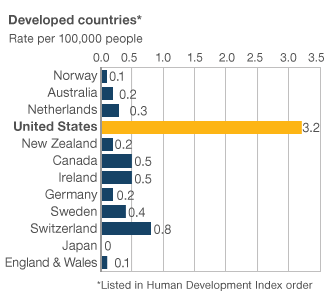 |
| The huge amount of people killed by guns is unique to America in the developed world. Source: BBC |
According to the CDC in 2013 there were 11,208 firearm
homicides, or 70% of the total homicides committed in the United States. This number is not even close to the total
number of people who were killed by firearms in 2013, which stood at a colossal
33,363. Despite this huge problem, the debate over gun laws is a hugely
divisive debate.
Many Americans, mostly on the conservative side of the
spectrum, will attack any law that
restricts the proliferation of firearms as unconstitutional due to the second
amendment. Whilst federal gun laws are arguably the weakest they have ever
been, for many gun lovers, they are still too strong. Furthermore, despite the failure
of the Senate to pass new gun regulations in 2013, many gun rights activists are
terrified that the government is going to confiscate their guns. As a result of the hysteria, many red states
have gone ahead and tried to nullify federal gun laws.
In 2014 the Washington Post pointed out that “In Idaho,
the Legislature unanimously passed a law to keep any future federal gun
measures from being enforced in the state. In Kansas, a law passed last year
says federal regulation doesn’t apply to guns manufactured in the state.
Wyoming, South Dakota and Arizona have had laws protecting “firearms freedom”
from the U.S. government since 2010.”
The nullification of federal laws outraged many liberals
who decried the efforts as unconstitutional. However I find that many of these
same liberals are perfectly happy to advocate nullification in an area that
suits them: Marijuana laws.
 |
| Source: Pew Research |
The federal government classifies marijuana as a schedule 1 drug, which means that it has a high potential for abuse, it has no
medical value, there is no way to use the drug safely consume it under medical
supervision, and no prescriptions may be written for it. Now whilst you may
take issue with this classification (I believe marijuana should be legalised), that
is not what this article is about. Whether you like it or not, this is federal
law in the United States as it stands today.
As a result of the federal government’s ridiculous laws
on marijuana, many states have effectively tried to nullify federal law on the
issue. As it stands now 19 states have legalised medical marijuana, 14 have decriminalised
possession and four (plus Washington D.C.) have legalised marijuana for
recreational purposes. This is a direct violation of federal laws. Many
conservatives have railed against the wave of marijuana legalisation in states
across America, frustrated that they have effectively nullified federal law.
So my question to liberals is this: why is it acceptable
to nullify federal laws on marijuana but totally unacceptable to nullify
federal gun laws? And for conservatives, why is it acceptable to nullify federal laws on guns but totally unacceptably to nullify federal marijuana laws?
These questions have totally stumped me, I can't think of a way for liberals or conservatives to justify their respective beliefs. If anyone would be kind enough to offer me an
explanation, other than the obvious that people support whatever results in
them getting their way, that would be great!
